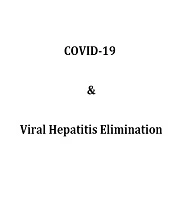Dear Editor,
In November 2019, several cases of acute respiratory distress syndrome emerged in Wuhan, Hubei, China (1). A novel SARS-CoV-2 virus was then identified as a causative agent for coronavirus infectious disease (COVID-19). On the 11th, March 2020, the World Health Organization (WHO) declared COVID-19 a global pandemic as the infection had spread to more than 150 countries (2). The impact of the pandemic on the health system was profound and led to reduced access to healthcare and a dramatic reduction in health services. Previous outbreaks such as Ebola showed that a temporarily severely compromised health system may lead to long-term deleterious consequences (3).
In 2016, the WHO declared an ambitious hepatitis elimination project by reducing new infections by 90% and reducing hepatitis-related mortality by 65% by 2030. In Duhok city, the Kurdistan Region of Iraq, a local initiative was established to combat and eliminate viral hepatitis. However, hepatitis elimination plans have been disrupted due to the burden and the pressure of COVID-19 on the health system and the impact of social distancing requirements or community reluctance. In Duhok city, strict social distancing measures were imposed with the appearance of first cases in Iraq. A state-imposed community-wide containment was declared, including a state-imposed curfew in the city. During the curfew, the health system was severely compromised, including closing all primary healthcare centers, including those offering vaccinations and viral hepatitis screening programs. In addition, 375 patients with chronic active HBV are registered in Azadi Hospital, which is the only center that offers treatment and regular follow-up for HBV patients. During the lockdown, none of the patients received the required care for HBV infection management. Besides, three patients with HCV are registered in the hospital. They have been receiving Harvoni for 12 weeks. Unfortunately, the treatment course has been disrupted. Hence, the COVID-19 outbreak undermined the three pillars of hepatitis elimination in Duhok: early diagnosis, treatment, and vaccination. In this difficult time, healthy skepticism should be reserved, and the foundation of clinical equipoise should be retained. Otherwise, our efforts to eliminate hepatitis will be negated and we may fall prey to the burden of new outbreaks of hepatitis. Obviously, the COVID-19 pandemic will have a long-term legacy and deleterious consequences on different parts of public health, particularly viral hepatitis elimination programs. The importance of hepatitis elimination makes it imperative for Duhok city and all countries to resume and keep the continuity of the elimination plan.
